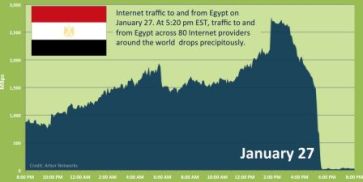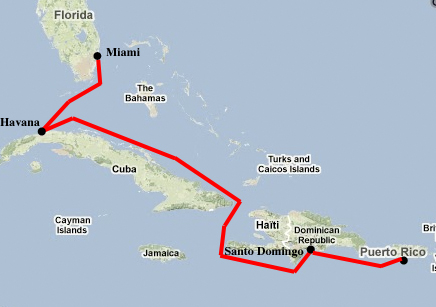Editor's note: This story was updated many times as the story evolved Friday. Please see updates below and click here for a more recent story on the situation.
Egypt has gone offline.
In a stunning development unprecedented in the modern history of the Internet, a country of more than 80 million people has found itself almost entirely disconnected from the rest of the world.
The near-disconnection--at least one Internet provider is still online--comes after
days of street protests demanding an end to nearly three decades of autocratic rule by President Hosni Mubarak. Those followed this month's
revolution in Tunisia, another country with little political freedom and high levels of corruption, and
reports of overnight arrests and clashes with security forces.
Jim Cowie, chief technology officer at Internet-monitoring firm
Renesys, said that at approximately 2:34 p.m. PT, his company "observed the virtually simultaneous withdrawal of all routes to Egyptian networks in the Internet's global routing table." (See CNET's
earlier coverage of network disruptions.)
"Virtually all of Egypt's Internet addresses are now unreachable, worldwide," Cowie wrote in a
blog post this evening.
A major service provider for Egypt, Italy-based Seabone, reported that there was no Internet traffic going into or out of the country after around 2:30 p.m. PT (12:30 a.m. local time), according to an Associated Press
dispatch.
Al Jazeera English
reported that the Mubarak government "denied disrupting communications networks" in advance of widespread protests planned at more than 30 mosques and churches on Friday, which is a day off in Egypt with banks and many businesses closed. (A spokesman for the Egyptian embassy in Washington, D.C., also
denied earlier reports that Facebook and Twitter were selectively blocked.)
While the cause of the disruption remains unknown, it seems clear that yanking Egypt's Internet addresses was a conscious decision, not the result of a fiber cut or a natural disaster. That means Egypt will be conducting a high-profile experiment in what happens when a country with a
$500 billion GDP, one that's home to the pyramids and the Suez Canal, decides that Internet access should be restricted to a trickle.
That trickle can be found at the
Noor Group, which appears to be the only Internet provider in Egypt that's fully functioning. (Cairo-based bloggers are speculating that its unique status grows out of its
client list, which includes western firms including ExxonMobil, Toyota, Hyatt, Nestle, Fedex, Coca-Cola, and Pfizer, plus the
Egyptian stock exchange.)
An
analysis posted by network analyst
Andree Toonk, who runs a
Web site devoted to monitoring networks, shows that yesterday there were 2,903 Egyptian networks publicly accessible via the Internet. Today, there are only 327 networks.
Noor is "the only provider that doesn't seem to be impacted by this," Toonk wrote.
That's led Egyptian Internet users, at least the ones still connected, to go on Twitter to
urge others to use Noor's dial-up numbers if their own network was down.
Unconfirmed reports from Egypt suggested widespread telephone outages as well. Early in the morning in Cairo, a series of complaints of mobile phone outages said
Mobinil, the country's largest mobile provider, was no longer providing service. Other reports said only land lines were working. Complaints about SMS outages have become common.
There are some parallels. Wired magazine's HotWired, succeeded by Wired.com,
reported in 1996 that "the U.S. government has quietly pulled the plug on Iran's Internet connection." During a state of emergency in Bangladesh in 2007, satellite providers were
ordered to cease airing any news shows. And in Burma later that year, the country's ruling military junta
pulled the plug on the nation's limited Internet access.
Twitter and
Facebook have become effective communications tools during social unrest and protests--in
Iran and
Moldova, along with Tunisia and
Egypt, more recently. YouTube videos, too, have
documented the massive street protests in Cairo.
Egypt's Internet disruptions coincided with activist action. Anonymous, the group that
launched distributed denial-of-service attacks on Web sites of financial institutions and others opposing WikiLeaks last year,
released a video in which it threatened to launch DoS attacks on Egyptian government Web sites if the authorities did not curtail censorship efforts.
Earlier today, five people were arrested in the U.K. in connection with those attacks.
The threats weren't necessary. Egypt's new firewall has brought down almost every entry on
a list of the 25 most popular Web sites in the country, including egypt.gov.eg, presidency.gov,eg, and cabinet.gov.eg. The exceptions are ones like jeep.com.eg, which are hosted in the United States. The
Web site for the U.S. Embassy in Egypt was unreachable.
In a YouTube interview today (see
transcript), President Obama stressed that Mubarak has "been an ally of ours on a lot of critical issues" and has "been very helpful on a range of tough issues in the Middle East." Obama added, however, that political reform "is absolutely critical to the long-term well-being of Egypt."
Egypt receives over $1.3 billion annually from U.S. taxpayers in the form of military aid,
according to the U.S. State Department.
Update 9:10 a.m. PT Friday: A check of Egypt's
top 25 Web sites shows that they're still offline, with the exception of a few like Chrysler's that are hosted in the United States.
Update 9:15 a.m. PT Friday: Vodafone
has confirmed in a statement that "all mobile operators in Egypt have been instructed to suspend services in selected areas," and its chief executive
said at a conference that the wireless provider was directed to "turn down the network totally."
Update 9:20 a.m. PT Friday: European networking organization RIPE has posted a telling
graphic showing how Egypt's network went dark. After the normal noise of networks being added and deleted, there was a sharp spike yesterday between 2 p.m. and 2:30 p.m. ET, and virtually no activity since.
Update 9:22 a.m. PT Friday: White House press secretary Robert Gibbs
said on Twitter: "Very concerned about violence in Egypt--government must respect the rights of the Egyptian people & turn on social networking and internet." Secretary of State Hillary Clinton said in a speech that "we urge the Egyptian authorities to allow peaceful protests and to reverse the unprecedented steps it has taken to cut off communications."
Update 9:45 a.m. PT Friday: Our sister site CBSNews.com has posted this
remarkable video of clashes between protesters and security forces.
Update 10 a.m. PT Friday: Here's a
telling chart of how many Egyptians are using the Tor anonymizing network. There's a dramatic spike around January 24, which coincided with the beginning of widespread protests. A second
chart shows Tor traffic from Egypt going back through November 2010.
Update 10:22 a.m. PT Friday: Al Jazeera English's online chief, Mohamed Nanabhay, is
reporting that "nearly 45 percent our of current web traffic to our @AJEnglish Egypt coverage is coming from America."
Update 10:40 a.m. PT Friday: There is no evidence, contrary to some reports, that Syria's Internet connection is down. Compare this
chart from an Egyptian provider showing the network going completely dark with
this one from the government-owned Syrian Telecommunications Establishment that depicts normal activity. Web sites in Syria remain accessible. The rumors originated a few hours ago when Al Arabiya news service
said that "Syria suspends all Internet services," and followed up with
a denial from the authorities. Reuters
reported earlier this week that Syrian authorities have banned programs that allow access to Facebook Chat from cellphones.
Update 10:50 a.m. PT Friday: Al Jazeera's frequently-updated
blog is reporting that military vehicles have entered the streets of Cairo and the president's party headquarters is on fire. The network has also created a
roundup of its Twitter-ing correspondents, who have just reported that "protesters appear to be looting the ruling National Democratic Party headquarters in Cairo." The NDP is chaired by Mubarak and has for decades maintained an iron grip on political power in Egypt.
Update 11:20 a.m. PT Friday: And now, U.S. economists analyze how social networks influence protests. Jeff Ely, an economics professor at Northwestern University,
writes: "Communications networks affect coordination. Before committing yourself you can talk to others, check Facebook and Twitter, and try to gauge the momentum of the protest...If it looks underwhelming you stay home, go to work, etc. And therefore so does everybody who gets similar information as you. All of you benefit from avoiding protesting when the protest is likely to be unsuccessful." George Mason's Tyler Cowen
adds that the security forces' response "increases the likelihood that the Egyptian government sees these protests as very serious indeed."
Update 12:35 p.m. PT Friday: Just finished a live CNET
Reporter's Roundtable on this topic with my colleagues Rafe Needleman and political scientist Deborah Wheeler. The archived video, once we process it, should appear
here.
Update 12:41 p.m. PT Friday: A faux
Twitter account for Hosni Mobarak--Al Jazeera is now reporting that his ouster is more likely than not--announces: "The Internet will be turned on again, but it will be read-only. Meaning that you will be able to read, but not write."
Update 12:45 p.m. PT Friday: I wrote a CNET
article earlier this week titled "Internet 'kill switch' bill will return" that reported on forthcoming legislation from senators Joseph Lieberman (I-Conn.) and Susan Collins (R-Maine). That's now getting passed around with
comments like "Mubarak flipped the "kill switch" in Egypt to shut down dissent" and
headlines like "Egypt's communications 'kill switch.'"
Update 12:55 p.m. PT Friday: On his Forbes.com blog, Andy Greenberg
writes: "On Friday afternoon, the loose hacker group Anonymous began a campaign to fax thousands of copies of WikiLeaks' latest missives--a series of State Department cables revealing human rights abuses under Egyptian President Hosni Mubarak and tacit U.S. backing for his administration--to Egyptian numbers." On the other hand, it doesn't seem as though protesters need any more information about government corruption. (Why did WikiLeaks wait so long to release these, by the way?)
Update 1 p.m. PT Friday: Renesys has
updated its post with a telling graphic showing how Egypt's globally reachable networks fell dark within a 15-minute period yesterday: "An estimated 93 percent of Egyptian networks (are) currently unreachable...Sequencing looks like people getting phone calls, one at a time, telling them to take themselves off the air. Not an automated system that takes all providers down at once; instead, the incumbent leads and other providers follow meekly one by one until Egypt is silenced."
Update 1:10 p.m. PT Friday: Index on Censorship's Egypt regional editor Ashraf Khalil is in Cairo and filed
a dispatch today. Excerpt: "Thanks to the blanket communications shutdown, the protests today took place in an information vacuum. On Tuesday, even during the demonstration, everybody was checking Twitter both to coordinate and for news on what was happening across the country. This time nobody knew what was happening anywhere else--not even on the other side of the river in Tahrir Square."
Update 1:12 p.m. PT Friday: The Internet Society is
condemning the Egyptian Net disconnection: "The Internet Society considers this recent action by the Egyptian government to block Internet traffic to be an inappropriate response to a political crisis. It is a very serious decision for a government to block all Internet access in its country, and a serious intrusion into its citizens' basic rights to communicate."
Update 1:20 p.m. PT Friday: And here's a Reddit.com
thread titled: "As evidenced by what is happening in Egypt, the only f--king way the president needs an emergency Internet kill switch is if the government is doing something really f--king bad."
Update 2:45 p.m. PT Friday: We've posted a
new article, and any further updates will appear there.





























